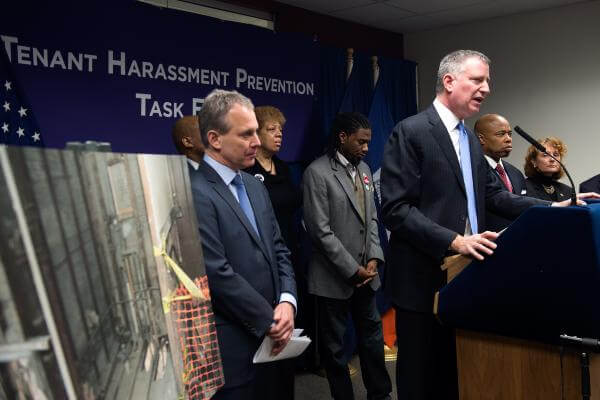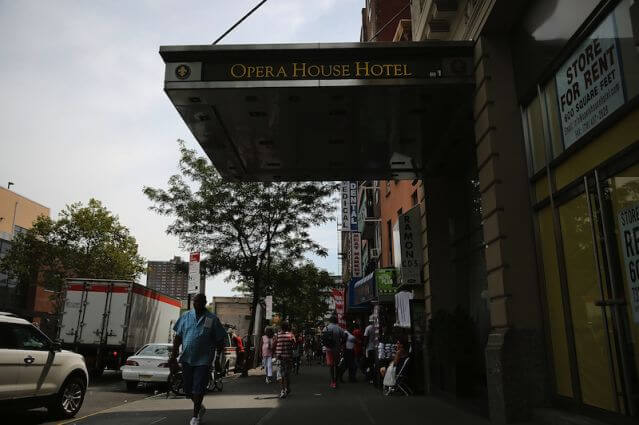New York City and state leaders put bad landlords on notice Thursday when they announced a new task force that opens the door for criminal charges for tenant harassment.
Attorney General Eric Schneiderman and Mayor Bill de Blasio stood together at the South Brooklyn Legal Services in Downtown Brooklyn as they decried displacement of long-time tenants by shrewd landlords who force residents out of rent-regulated units and replace them with market-rate tenants. In fiscal year 2013, the city’s housing court reported 752 tenant harassment complaints, de Blasio told reporters. Another 426 complaints have been filed since July 2014.
Housing advocates around town praised a crackdown on the unscrupulous landlords, even as the city’s most prominent landlord trade group warned against intimidating and punishing all owners for the bad acts of a few. “We need enforcement of existing laws to preserve affordable housing for the poor and working families, not politically driven schemes that would place the city on a road back to housing abandonment of the 1980s,” said Rent Stabilization Association President Joseph Strasburg in a statement to Metro. Strasburg explained that demonizing landlords who tend to rent-stabilized units could backfire and make them apprehensive of doing upgrades and improvements if a single tenant’s complaint could trigger a criminal investigation. Edward Josephson of South Brooklyn Legal Services defended the newfound threat of criminal litigation against abusive landlords.
One of the legal nonprofit’s clients was forced to live without a bathroom in her Bushwick apartment on Linden Street when the landlords — brothers who racked up almost 500 housing code violations combined last year — destroyed the bathroom in her rent-stabilized apartment. Josephson said she has a bathroom and kitchen again only after a prolonged legal battle and media attention.
“It took an epic battle just to get one person’s bathroom fixed,” he said. “It was a very heavy lift to get something simple done.”
A threat of prosecution might induce especially bad landlords to turn the heat on and fix the buildings, he added.
“If there had been a criminal investigation from the get go, they would have fixed that bathroom,” Josephson said.
But the task force’s potential as a deterrent for bad behavior doesn’t necessarily fix the problem, Ilana Maier, program director of of advocate group the Metropolitan Council on Housing. “The most important thing to do is to repeal the file policy of vacancy deregulation,” Maier said.
Rent-stabilized apartments, which can only have rents raised certain amounts pre-determined every year by the city’s Rent Guidelines Board, are often deregulated if the legal rent exceeds $2,500 after a vacancy. “The only way to stop landlords from doing this is to stop the incentive,” Maier added.
Housing advocates cheer, landlord group jeers at new task force targeting tenant harassment

NYC Mayor’s Office/Twitter


















